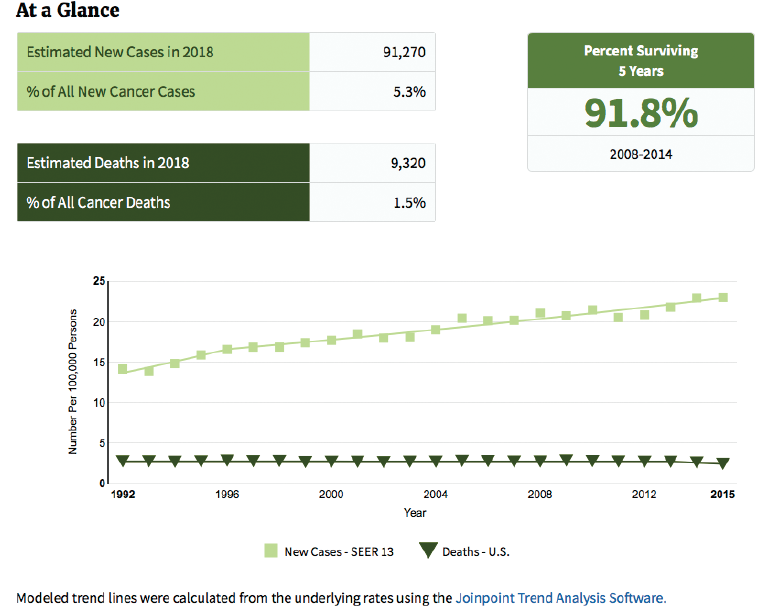Globally, mortality rates for melanoma among men are either rising or remain unchanged as mortality rates in women decrease. As a result, men around the world are dying from melanoma at higher rates than women are. Findings come from an observational analysis of the World Health Organization (WHO) mortality database between 1985 and 2015 and were reported last month at the United Kingdom's National Cancer Research Institute (NCRI) annual conference.1 While this is not the first evidence of sex disparity in malignant melanoma (MM) progression and mortality, it is a cause for concern as dermatologists continue to confront the melanoma epidemic.
What We Know
Researchers analyzed 30 year global MM mortality trends from the World Health Organization mortality database. They identified 33 countries classified by WHO as having high usability death registration data, then used ICD-9 and 10 codes for MM to extract age-standardized death rates (ASDRs) for each country.

Figure. SEER Data show increasing incidence of melanoma but slight decrease in mortality, overall. Courtesy of NIH
Results show that the highest overall three-year average ASDRs for 2013-2015 were in Australia and Slovenia; they were lowest in Japan. In all countries, MM mortality remained greater in males than females across the observation period. With the exception of Czech Republic, all countries had increased mortality rates in males over the observation period. However, over the same time period, mortality rates in women stayed the same or decreased. Israel and Czech Republic had the most significant percentage decreases in female mortality rates over the observation period (−23.4 percent and −15.5 percent respectively).
Previous research has shown that female melanoma patients generally exhibit significantly longer survival than male patients. In a population-based cohort study involving a total of 11,774 melanoma cases from the Munich Cancer Registry, a significant female advantage was observed for melanoma-specific survival. Women were at a lower risk of progression, including a lower risk of lymph node metastasis and visceral metastases. Of note, women retained a significant survival advantage even after first progression and lymph node metastasis; the benefit after visceral metastasis was described as borderline significant.2
Another German cohort study showed a longer time to development of melanoma metastasis in women than in men (40.5 months, versus 33 months) and higher five-year survival rates after distant recurrence for women than men (15.3 percent, versus 5.2 percent). The study looked at 7,338 patients diagnosed with an invasive primary cutaneous melanoma without clinically detectable metastases. Of these, 1,078 developed subsequent metastases.
For 18.7 percent of men and 29.2 percent of women, the first metastasis following diagnosis of primary melanoma was locoregional (satellite/in-transit metastasis). For 27.3 percent of men and 23.2 percent of women, there was direct distant metastasis. For the majority of men and women, however, direct regional lymph node metastasis was most common. It occurred in 54 percent of men and 47.6 percent of women.
Researchers note that it is unclear whether hormonal or immunologic factors may be responsible for sex differences in progression and survival.3
Another, larger study using data from three large RCTs in Europe analyzed sex differences in survival and progression among patients with stage III or IV MM. Once again, women had higher rates of disease-specific survival and progression-free survival.
Among 2,734 stage III patients, the five-year survival rate was 51.5 percent for women, compared to 43.3 percent for men. Among 1,306 stage IV patients, the two-year survival rate for women was 19 percent, compared to 14.1 percent for men. When researchers looked at factors such as age, they found that the female advantage was consistent across pre- and postmenopausal age categories and across different prognostic subgroups.
In this analysis, researchers concluded that, since the female advantage persists even after metastasis to lymph nodes and distant sites, theories about sex behavioral differences as an explanation for this phenomenon are insufficient. Rather, they suggest a biologic sex trait, “seems to profoundly influence melanoma progression and survival, even in advanced disease.”4
What We Can Do
Researchers continue to investigate what biologic factors contribute to the more favorable prognosis among women with malignant melanoma, compared to men. As noted, progression and survival patterns may not be attributable solely to patient behaviors that may be sex-linked. That said, until we have a better understanding of risk factors and management, early identification and treatment of suspicious lesions provides the best chance for early intervention and cure.
Data suggest that there may be sex-based differences in self-examination and care-seeking behaviors. Interestingly, a small study (n=30) suggests that women may delay seeking medical attention for changing moles. While men seldom or never acknowledged interest in attention to bodily changes, they were more likely to quickly seek medical evaluation of a changing mole that they noticed. Men also were compliant with wives' and relatives' advice about seeking care. Women, on the other hand, reported that they paid attention to bodily changes, but they often delayed seeking medical attention, citing family responsibilities and emotional struggles. Women were also more likely to attempt self-care remedies before seeking professional care.5 Other data suggest that women are more likely than men to present to the dermatologist for evaluation of a self-detected melanoma.6
The increasing global mortality from MM among men serves as a stark reminder to dermatologists of the need to educate all patients—but especially men—about the importance of early detection and treatment of suspicious lesions. Men and women require education on the proper conduct of skin self-exams and require encouragement to seek dermatologic evaluation of concerning lesions as quickly as possible. Regular exams by a dermatologist (preferably) or general practitioner is also highly recommended, especially for those who cannot or will not conduct self-exams.
1. Yang D, Salciccioli J, Marshall D, Shalhoub J. Trends in mortality from malignant melanoma: an observational study of the World Health Organisation mortality database from 1985 to 2015. Published in Selected Abstracts from the 2018 NCRI Cancer Conference of National Cancer Research Institute. British Journal of Cancer. 2018; 119:1-49.
2. Joosse A, de Vries E, Eckel R, Nijsten T, Eggermont AM, Hölzel D, Coebergh JW, Engel J; Munich Melanoma Group. Gender differences in melanoma survival: female patients have a decreased risk of metastasis. J Invest Dermatol. 2011 Mar;131(3):719-26.
3. Mervic L. Time course and pattern of metastasis of cutaneous melanoma differ between men and women. PLoS One. 2012;7(3):e32955.
4. Joosse A, Collette S, Suciu S, Nijsten T, Patel PM, Keilholz U, Eggermont AM, Coebergh JW, de Vries E. Sex is an independent prognostic indicator for survival and relapse/progression-free survival in metastasized stage III to IV melanoma: a pooled analysis of five European organisation for research and treatment of cancer randomized controlled trials. J Clin Oncol. 2013 Jun 20;31(18):2337-46.
5. Hajdarevic S, Schmitt-Egenolf M, Brulin C, Sundbom E, Hörnsten A. Malignant melanoma: gender patterns in care seeking for suspect marks. J Clin Nurs. 2011 Sep;20(17-18):2676-84.
6. Avilés-Izquierdo JA, Molina-López I, Rodríguez-Lomba E, et al. Who detects melanoma? Impact of detection patterns on characteristics and prognosis of patients with melanoma. J Am Acad Dermatol. 2016 Nov;75(5):967-974.
Recommended
- Skin Cancer & Photoprotection
DermWireTV Extra: Dr. Bhatia and Dr. Schlesinger Discuss Collaboration With Oncologists











